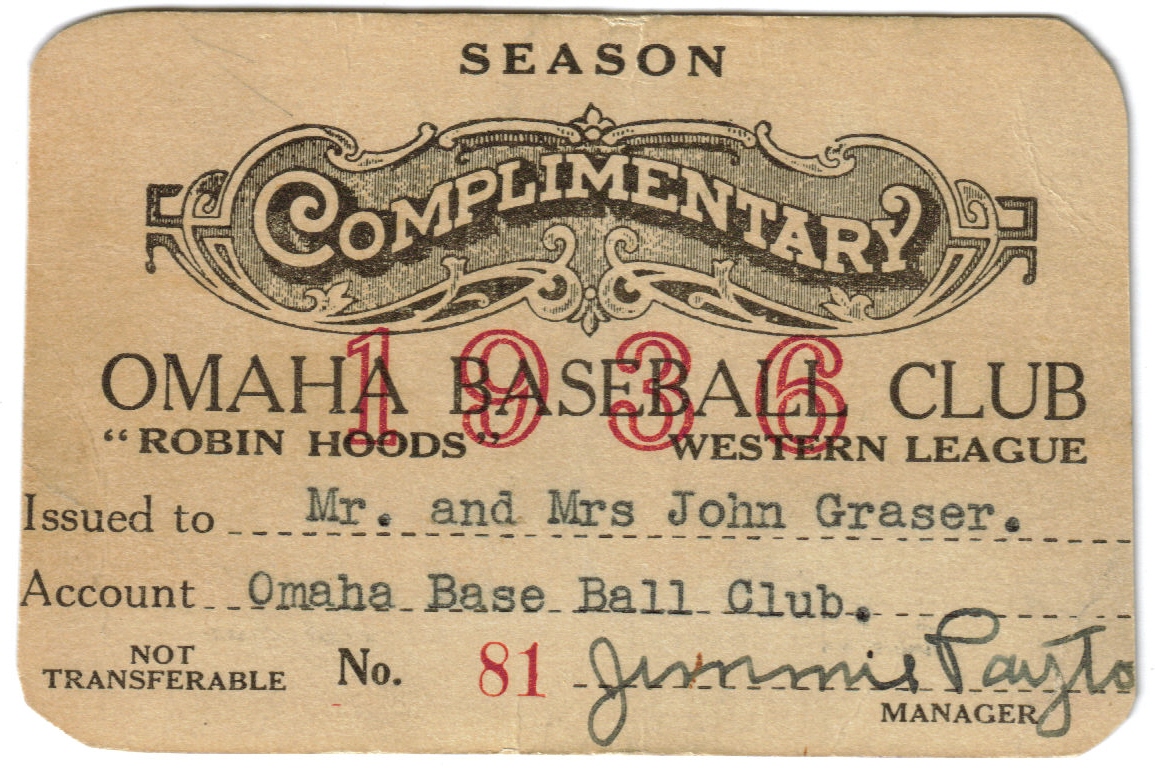
|
| Image courtesy Dan Bretta |

|
| Image courtesy Dan Bretta |
|
Western League
Standings 1936 President: |
|||
| Standings | Wins----- | Losses--- | GB |
| Davenport Blue Sox | 39-35 | 26-26 | -- |
| Sioux City Cowboys | 35-26 | 30-34 | |
| Omaha Robin Hoods/Rock Island Rocks | 33-29 | 29-35 | |
| Cedar Rapids Raiders | 35-35 | 31-27 | |
| Des Moines Demons | 33-31 | 31-31 | |
| Waterloo Hawks | 25-25 | 41-38 | |
|
Season split into halves. Davenport won the first half with 39 wins and the second half with 35 wins. |
|||
|
Things were looking up for Omaha baseball at the start of the 1936 season. After the financial problems of 1935 it looked like Omaha might go without a team in 1936. The team that started in Omaha in 1935 and moved to Council Bluffs was defunct and the players were released as free agents. Larry Harlan, a Lincoln businessman, owned the Keokuk franchise and was allowed to move the team to Omaha. G. H. Jimmie Payton was the general manager. In addition he established a partnership with the Fontenelle Brewing Company and it looked like Omaha's money woes were finally over. The team was named the Robin Hoods after the flagship beer made by Fontenelle. The park was spruced up, new uniforms were acquired and it looked like the year would be one without financial troubles. The two of them spent a lot of time and effort trying to establish a relationship with a major league club. They tried to peddle Lyle Johnson "a big husky swede" as their primary prospect from the team. Lyle wound up with a 1-1 record in 1936 and that was the last time he was in organized ball. Unfortunately, their season was one of disaster after disaster. First a windstorm damaged the ballpark on 13th and Vinton causing the team to move a series of home games to Lincoln.
|
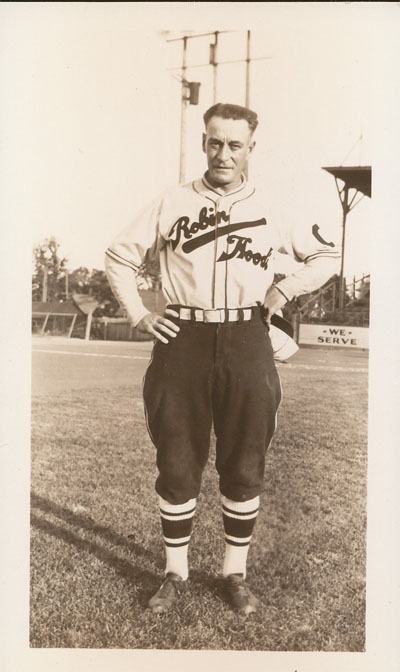
|
| Plaver Images Courtesy Andy Bowers |
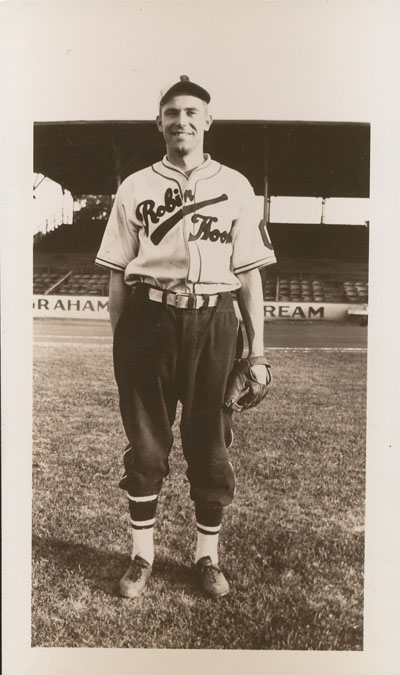
|
President Larry Harlan had Hank Severeid as manager at the beginning of
the season. Hank was from Story City Iowa. He started his career with
Burlington in 1909 and broke into the majors in 1911 with the Reds. In
1915 he was with the Browns and was in the American League through the
1926 season. After a dismal first half, Larry moved Hank to a desk job
and named Clarence Mitchell and Keith Clark as player managers. Keith had
played with Kansas City, New Orleans, Topeka, Bloomington, Lincoln and
Norfolk (NSL). In August Keith was injured and Hank took over the duties
of catcher when Clark could not play. Former Western League manager Jimmie
Payton was hired to be the business manager for the team.
Omaha lost their Western League team on August 13, 1936 when a fire destroyed League Park on 13th and Vinton. The fire started late at night under the grandstand. Although the Robin Hood's were out of town at the time, the ballpark was being used by barn storming teams. The wood stands went up in a hurry and the fire spread to nearby houses on 13th street damaging a number of the houses. The team lost both their stadium and their uniforms. The team moved to Rock Island Illinois to complete the 1936 season. Eventually, the team became a road team finishing the season without a home park. The financial situation of the city was such that replacing the park was out of the question. Omaha was to go without professional baseball until after World War II.
|
|
M. Argus "Dutch" Prather played first base for the Robin Hood's in 1936. He was one of two players on the team that played every game for the team. He averaged .322. The 29 year old from Branch Arkansas started his professional careerin 1927 and played through the 1949 season and played for 23 different minor league teams. In the dirt at second base was Ed Williford. He played in 120 games and averaged .290 for the season. Third base for the team was rotated between three players, Joseph Spadafore played in 54 games at third and 119 games total and averaged .260 for the season. Joe was born in Tacoma Washington and is in the Tacoma Sports Hall of Fame. Ed DeCuir played 50 games for Omaha and 60 games for Waterloo and averaged .246. Martin Tierney also played in the infield and averaged .236. The shortstop position was held down by George Wise. He played in 62 games for Omaha/Rock Island and 62 for Waterloo and averaged .257. Behind the mask in 1936 was Keith Clark He played in 81 games and averaged .280. He played in 8 games for the Kansas City Blues in 1929. Keith started his professional career with Norfolk in the Nebraska State League in 1922 and 1923. Hank Severeid was a 45 year old catcher/manager for Omaha. He made his major league debut in 1911 as a 20 year old catcher for the Reds. He played with the Reds and the Browns through the 1925 season. Alex Coleman played in 14 games and averaged .281, Loyal Hodge played in 12 games and averaged .186, Leo Kintana played in 13 games and averaged .271 and Joseph Dike played in 10 games and averaged .366. John Doljack played in 58 games and averaged .229. He played for three different teams in 1936. Rudolf Laskowski averaged .234 and played in 42 games in the Western League. Martin Tierney played for both Des Moines and Omaha in 1936. He averaged .231 in 58 games. |
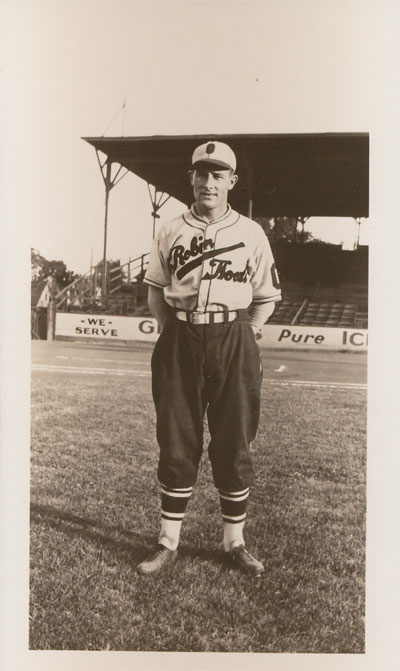
|
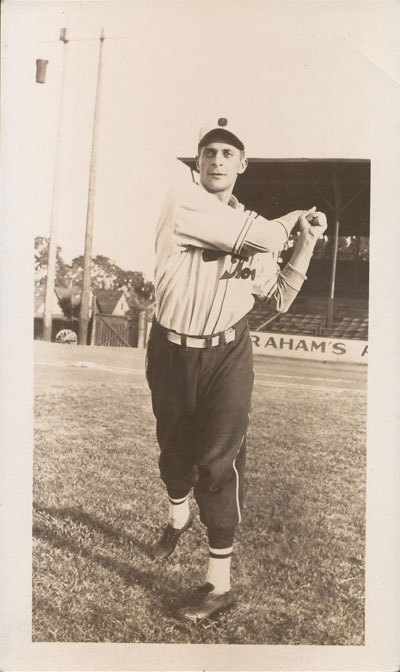
|
Outfield:
Russ Scarritt was another regular in the outfield in 1936. He averaged .302 for the season. The Florida born player, played in the majors from 1929-1932 for Boston in the American League and Philadelphia in the National League. Pid Purdy played 46 games in the outfield for Omaha and averaged .272. Pid was from Beatrice and played for multiple teams in Nebraska during his career.
Pitchers: Charles Wolfe pitched in 30 games for Omaha in 1936. He was 13-10 and had 133 k's, one strike out behind the league leader. Dale Mills played in 31 games and was 14-12 for the season.
|
Lyle Johnson pitched in 8 games and recorded a 1-1 record.
Frank Papish was in 29 games and had a 10-16 record. He was a 18 year old from Pueblo Colorado in his first year of professional ball. He played for Dallas in 1937, Longview in 38, Anniston in 1939 and 1940. He made it to the majors in 1945 and played in the majors for five years. Stops in Indianapolis, Chattanooga and Memphis rounded out his professional baseball career.
Henry Smith was 5-8 with Omaha in 1936. He moved to the left coast for 1937 and was 21-10 with Vancouver.
Vance Cauble pitched in 29 games and was 5-8 for the season. In 1940 he was the MVP of National Baseball Congress world series, playing for Enid Oklahoma.